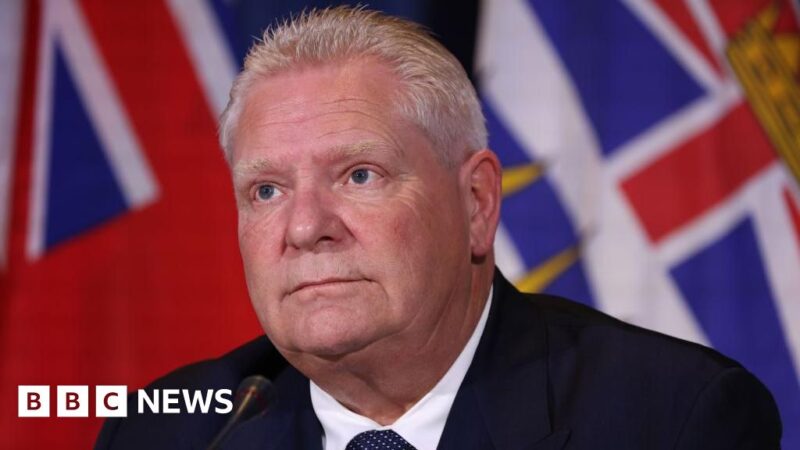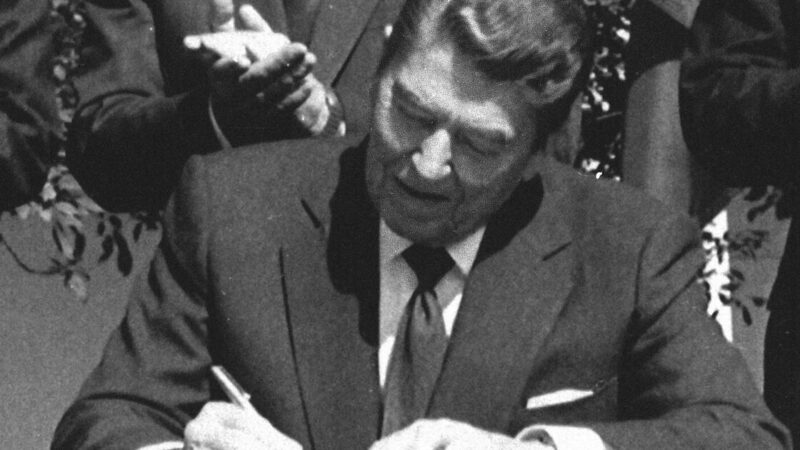Russell Vought – from Project 2025 to Trump’s shutdown enforcer
Anthony ZurcherNorth America correspondent
Donald Trump had a warning to Democrats.
Soon he will decide what “Democrat agencies” he would cut and whether those reductions would be temporary or permanent.
He said the government shutdown, which began on Tuesday, had afforded him an “unprecedented opportunity”.
“I have a meeting today with Russ Vought, he of PROJECT 2025 Fame,” he posted on his Truth Social website on Thursday morning.
Vought, the director of the White House Office of Management and Budget, may not be a household name.
But Project 2025, a conservative blueprint for governing put together primarily by former Trump officials like Vought when the Republicans were out of power, featured prominently during last year’s presidential campaign.
The 900-page policy document contained proposals for dramatic reductions in the size of federal government, expanded presidential authority, rigorous immigration enforcement, a nationwide abortion ban and other elements of an ultra-conservative social agenda.
It was frequently touted by Democratic presidential nominee Kamala Harris, as Trump’s “dangerous plan” for the future if he was to win.
At the time, seeking to reassure undecided voters, Trump tried to distance himself from the policy document.
“I know nothing about Project 2025,” Trump wrote in July 2024. “I disagree with some of the things they’re saying and some of the things they’re saying are absolutely ridiculous and abysmal.”
Now, however, Trump is using the conservative blueprint as a threat to get Democrats to agree to his budgetary demands. And he is holding up Vought, who authored a chapter on the use of executive power, as a kind of budgetary angel of death, ready to take a scythe to government programmes near and dear to Democrats.
In case that particular metaphor wasn’t clear, on Thursday night Trump shared an AI-generated parody music video on Truth Social with Vought portrayed as the grim reaper, set to altered lyrics of Blue Oyster Cult’s Don’t Fear the Reaper.
On Capitol Hill, Republican leaders have echoed Trump’s characterisation of Vought as the White House heavy.
“We don’t control what he’s going to do,” Republican Senate Majority Leader John Thune said. “This is the risk of shutting down the government and handing the keys to Russ Vought.”
Senator Mike Lee of Utah told Fox news that Vought had been “preparing for this moment since puberty”.
That may be a bit of an overstatement, but Vought, who cut his teeth as a congressional staffer for Republican budget hawks and helped run the lobbying arm of the Heritage Foundation, a conservative think tank, has a wealth of experience digging through the intricacies of the federal budget.
The bean-counter behind the president
He spent a year as the deputy director of the White House budget office during Trump’s first term, rising to be its director in 2019. Unlike many who served with Trump during those first four years, Vought had staying power – and was quickly reinstalled as head of the budget office when Trump returned this year.
“A lot of those who didn’t come back represent an old way of thinking,” said Richard Stern, a Heritage economic policy director who, like Vought, began his career in conservative congressional budget circles. “Russ was ahead of his time in the first term and right on time now.”
Although Vought isn’t one to shy away from controversial statements – he once said that he aspired to be “the person who crushes the deep state” – he doesn’t exactly look the part of a Republican bogeyman.
Balding and bespectacled, with a greying beard, Vought’s public statements typically have the measured cadence of a bean-counter or professor. He lacks the narrow-eyed glower and amped-up rhetoric of Stephen Miller, another longtime Trump adviser who oversees White House immigration policy.
Make no mistake, however, Vought has become an influential player in this White House, having turned the Office of Management and Budget – usually referred to by its acronym OMB – into the principal engine behind Trump’s push to slash government spending and its workforce.
Earlier in the year he worked closely with Elon Musk and his so-called Department of Government Efficiency, or “Doge”, as they cut a scorched-earth path through the federal government, shuttering multiple agencies and downsizing entire departments. And he carried on the efforts after Musk departed and Doge largely dropped out of public view.
“OMB is an intrinsically powerful position, but it has almost never been wielded as such,” Stern said. “Its people have tended to caretake and allow the bureaucracy to slowly grow. It is as influential as the person who wields that chair wants to make it.”
Seizing opportunity in shutdown
Now Trump has threatened to unleash Vought at a time when, because of the legal limbo created by the government shutdown, their cuts might be deeper and more durable than those instituted earlier this year by Doge.
Former House Speaker Newt Gingrich, a veteran of the big shutdown fights of the 1990s, told NPR that Vought and his team have been preparing for exactly these kind of circumstances while they were in the political wilderness during the Biden years.
“They all knew a government shutdown was possible,” he said. “I think they had decided early on that you’re only going to get the scale of change they want if you’re very tough and very determined and every chance you get, you take the opportunity.”
The opportunity this shutdown presents for budget-cutters like Vought is that, without congressionally approved funding, the government is operating in a legal grey area with fewer budgetary restrictions.
The White House can, in theory, slash funding and staffing deeper than it could earlier in the year, when spending was governed by baseline appropriation amounts. And while permanent layoffs would still have to abide by a 60-day notice, Vought could start that clock ticking whenever he, and Trump, so choose.
Vought already has announced major infrastructure projects in New York City and Chicago are on hold, citing the need for a review of potentially illegal racial hiring practices – a review that he said can’t take place during the shutdown. He’s also cancelled nearly $8bn in clean energy projects across 16 states, all of which backed Harris, Trump’s opponent, in last year’s presidential race.
Democrats and federal worker unions have promised to fight these reductions in court and claimed that Trump is making largely empty threats to try to pressure them into abandoning the fight.
Many economists have pointed out that the White House reductions have been accompanied by other deficit-ballooning policies, which could undercut their attacks on Democrats for being the party of fiscal irresponsibility.
“Republicans are increasing spending in other areas and cutting taxes at the same time,” Brett House, an economics professor at the Columbia University School of Business noted. “The notion that they’re devoted to fiscal prudence is not borne out by their actions.”
Some Republicans in Congress have expressed concern that the apparent glee with which Trump is touting Vought-ordered cuts could turn public opinion against them if the shutdown stretches on.
Republicans have been warning of the dire consequences of the shutdown on government services – part of a concerted effort to portray Democrats as the ones to blame. Doing so while celebrating the new ways the administration is slashing programmes could derail those efforts.
“Russ is less politically in tune than the president,” South Dakota Senator Kevin Cramer, a member of the “Doge caucus”, told the news website Semafor.
“We, as Republicans, have never had so much moral high ground on a government funding bill in our lives… I just don’t see why we would squander it, which I think is the risk of being aggressive with executive power in this moment.”
Thom Tills, a North Carolina senator who has chosen not to run for re-election next year, warns that administration officials “need to be really careful” in how they present any new cuts.
The Doge-directed layoffs and programme cuts were largely unpopular, according to public-opinion surveys, causing a drag on the president’s approval ratings. A reprise of that now could be perilous.
According to Stern, however, the White House, and Vought, may view the long-term benefits as well worth the short-term challenges.
“For Russ, for myself, for anybody who’s in the budget space, this country is going bankrupt,” he said. “Whatever the political risks of trying to do the right thing, we have to do it. If we do nothing, this country will implode.”
news/articles/c059ydyqe19o?at_medium=RSS&at_campaign=rss”>Source link






